Unit1 -2 直接引语与间接引语 Grammar
高一英语Unit 1 grammar直接引语与间接引语-人教版[整理]
![高一英语Unit 1 grammar直接引语与间接引语-人教版[整理]](https://img.taocdn.com/s3/m/8c5ea96ea45177232f60a278.png)
Conclusion
1. 当主句的谓语动词是一般现在时的时候 2. 当主句的谓语动词是将来时的时候 3. 当直接引语部分带有具体的过去时间状 语时 4. 当直接引语中有以when, while引导的从 句,表示过去的时间时 5. 当直接引语是客观真理或自然现象时 6. 当引语是谚语、格言时 7. 当直接引语中有情态动词should, would, could, had better, would rather, might, must, ought to, used to, need时
Tom
said that they were listening to the pop music. Mother asked, “Have you finished your homework before you watch TV?” Mother asked me whether I had finished my homework before I watched TV.
Our teacher said to us, “Light travels faster than sound. ” Our teacher told us that light travels faster than sound. He said,“Practice makes perfect. ” He said that practice makes perfect. He said, “She must be a teacher. ” He said that she must be a teacher. The doctor said, “You'd better drink plenty of water. ” The doctor said I'd better drink plenty of water.
Grammar直接引语与间接引语
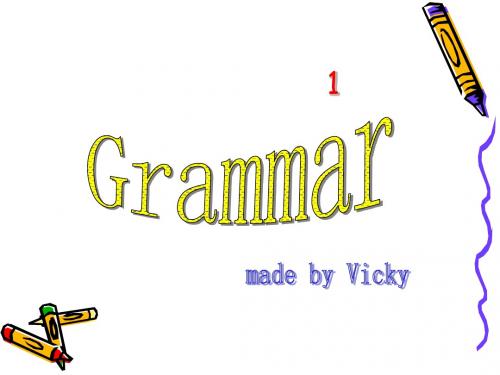
He asked , “Can I borrow your bike?”
He asked whether/if he could borrow my bike.
Tom said to me, “Do you like football?”
Tom asked me whether/if I liked football.
He said that he liked it very much. He said to me,“I’ve left my book in your room.”
He told me that he had left his book in my room.
直接引语中的状语
间接引语中的状语
状 语 变 化
My brother said to me, “I’m going to have a holiday next week.
My brother told me he was going to have a holiday the next week.
Mother said to me, “What are you doing in the room?” Mother asked me what I was doing in the room.
直接引语为疑问句时变间接引语的句型变化:
直接引语为疑问句时,变为间接引语时除注意在人称、 时态和状语等方面相应变化外,还应注意:
• 间接引语应改为陈述语序。 • 特殊疑问句的疑问词应保留。 • 一般疑问句、选择疑问句和反意疑问句在变为间接引语时要用连 词whether(或if)。 “Is there something wrong,Madam?”asked the policeman. The policeman asked the woman whether/if there was something wrong. She asked, “What it is? What’s going to happen now?” She asked what it was and what was going to happen then. “It’s Mary,isn’t it?”asked Jane. Jane asked whether it was Mary.
(完整版)英语语法----直接引语和间接引语
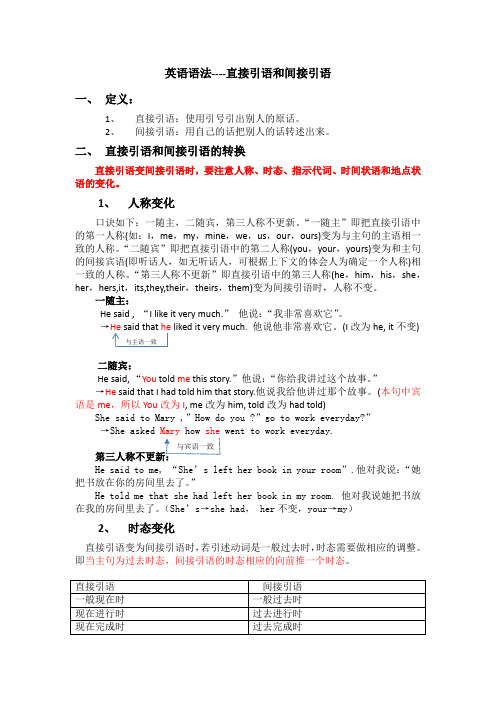
英语语法----直接引语和间接引语一、 定义:1、 直接引语:使用引号引出别人的原话。
2、间接引语:用自己的话把别人的话转述出来。
二、 直接引语和间接引语的转换直接引语变间接引语时,要注意人称、时态、指示代词、时间状语和地点状语的变化。
1、 人称变化口诀如下:一随主,二随宾,第三人称不更新。
“一随主”即把直接引语中的第一人称(如:I ,me ,my ,mine ,we ,us ,our ,ours)变为与主句的主语相一致的人称。
“二随宾”即把直接引语中的第二人称(you ,your ,yours)变为和主句的间接宾语(即听话人,如无听话人,可根据上下文的体会人为确定一个人称)相一致的人称。
“第三人称不更新”即直接引语中的第三人称(he ,him ,his ,she ,her ,hers,it ,its,they,their ,theirs ,them)变为间接引语时,人称不变。
一随主:He said , “I like it very much.” 他说:“我非常喜欢它”。
→liked it very much. 他说他非常喜欢它。
(I 改为he, it 不变)二随宾:He said, “You told me this story.”他说:“你给我讲过这个故事。
”→He said that I had told him that story.他说我给他讲过那个故事。
(本句中宾语是me ,所以You 改为I , me 改为him, told 改为had told)She said to Mary ,”How do you ?”go to work everyday?” →She asked Mary how she went to work everyday. 第三人称不更新:He said to me, “She’s left her book in your room ”.他对我说:“她把书放在你的房间里去了。
1Grammar直接引语与间接引语

4. “I am a teacher,” Jack said. →He said _________. D A. that I am a teacher B. I was a teacher C. that he is a teacher D. he was a teacher
5. He said, “Mother, the boy is very naughty.” C very naughty. →He _____A. said his mother that the boy was B. said to his mother that the boy is C. told his mother that the boy was D. spoke to his mother that the boy was 6. “You’ve already got well, haven’t you?” she asked. B →She asked ________. A. if I have already got well, hadn’t you B. whether I had already got well C. have I already got well D. had I already got well.
if
it is easy to improve the condition of the soil. is was
asked
They asked him if it was easy to improve the condition of the soil.
3.对特殊疑问句的转述,常使用原来的疑问 词作连词。
2. 如果直接引语所表述的内容在目前和说话 时同样有效,变间接引语时,时态可不变 The children said, “We love this game.” The children said that they love that game. 3. 主句谓语动词的时态是现在时态,在引述 时,时态不变。 She says, “I’ll never forget the days in the country.” She says that she’ll never forget the days in the country.
高一英语必修一Unit1Grammar语法直接引语间接引语
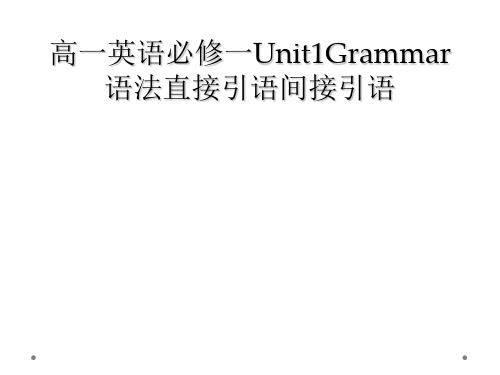
仍用一般现在时。例如: Teacher said to us:" The moon moves round
the earth." Teacher told us the moon moves round the earth. The teacher said to us : “Light travels faster
宾语从句
判断以下哪些句子属于间接引语
She said that she didn’t want to be a teacher. 间接 She said, “I don’t want to be a teacher〞.直接 He said, “ I like playing football〞. 直接 He said that he liked playing football. 间接
3. Mr Black said, “I have walked a long way this week.〞 Mr Black said that __ a long way __. A. I had walked…last week B. he had walked…that week C. I walked…last week D. he has walked…this week
〞 • 间接引语 Mum told me that I could clean my bedroom the next day . • Mr. Smith said,“He is a good worker. ’’ • Mr. Smith said that he was a good worker.
3.人称的变化
• 直接引语里的第一人称和第二人称,变间接引语时,人称要做相 应调整。例如:
仁爱版九年级英语unit1,Unit2重点语法

一、现在完成时:表示过去已经发生或已经完成的某一动作对现在造成的影响或结果。
即“过去的动作+ 现在的结果”,强调结果。
如:I have bought a new bike. (= I bought a new bike, and I have a new bike now.)我已经买了一辆新的自行车。
(强调我现在有了一辆新车。
)(一)构成形式:助动词have / has + 动词的过去分词肯定句:I have seen the film. 我已经看过这部电影。
否定句:I haven’t seen the film. 我没看过这部电影。
一般疑问句:Have you seen the film? 你看过这部电影了吗?回答:Yes, I have.是的,我看过了。
No, I haven’t.不,我没看过。
特殊疑问句:What have you done?你已经做了什么?(二)have/ has been to与have/ has gone tohave/ has been to + 某地,到过某地,说话时人已经回来了。
have /has gone to + 某地,说明去了某地,说话时人还没回来。
如:I have been to Beijing twice. 他去过北京两次。
---- Where is Jim? 吉姆在哪儿?--- He has gone to the library? 他去图书馆了。
(三)现在完成时常与下列表不明确的状语连用:1.already 和yetalready “已经”(多用于肯定陈述句),如:He has already gone home. 他已经回家了。
yet “已经; 还”(用于否定句或疑问句),如:Have you found him yet? 你已经找到他了吗?I haven’t finished my homework yet. 我还没完成作业。
※already 也可用于疑问句,表“出乎意料或惊奇”Have you finished your homework already? 难道你已经完成作业了?2.ever 和neverever “曾经”(多用于疑问句,问初次经历),如:I have ever been abroad. 我曾出过国。
英语必修一直接引语和间接引语

Grammar Direct speech & Indirect speech一. 直接引语(Direct speech)和间接引语(Indirect speech)1. 直接引语(Direct speech):讲述别人的原话,并把它放在引号里。
2. 间接引语(Indirect speech):用自己的话转述别人的话,并且不能用引号。
Anne said: “ I am crazy about nature.” (Direct speech)She said that she was crazy about nature. (Indirect speech)二. 变间接引语时注意的要点1.人称的变化(直接引语里的第一人称和第二人称,变间接引语时,人称要做相应调整。
)1. She said: “I am hungry.”She said she was hungry.2. Mum said to me:“ Y ou can do it yourself.”Mum told me that I could do it myself.3. Mr. Smith said, “He is a good worker.’’Mr. Smith said that he was a good worker.Exercises (Have a try) :1. Jack said to me, “You look worried today.”Jack told me that ________ looked worried that day.2. We said to her, “They’re cleaning the room.”We told her that __________ were cleaning the room.3. Mr. Black said, “I have walked a long way.”Mr. Black said that __________ had walked a long way.2.时态变化直接引语变间接引语时,间接引语的时态要与主句的时态一致。
人教版高一英语--直接引语与间接引语的转换
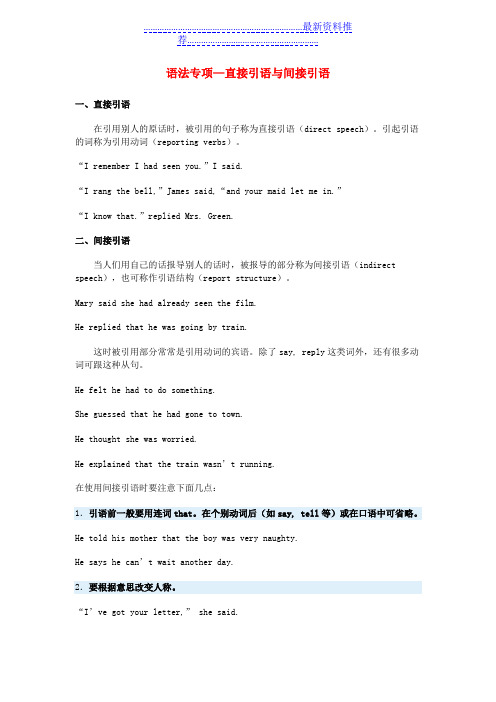
语法专项—直接引语与间接引语一、直接引语在引用别人的原话时,被引用的句子称为直接引语(direct speech)。
引起引语的词称为引用动词(reporting verbs)。
“I remember I had seen you.”I said.“I rang the bell,”James said,“and your maid let me in.”“I know that.”replied Mrs. Green.二、间接引语当人们用自己的话报导别人的话时,被报导的部分称为间接引语(indirect speech),也可称作引语结构(report structure)。
Mary said she had already seen the film.He replied that he was going by train.这时被引用部分常常是引用动词的宾语。
除了say, reply这类词外,还有很多动词可跟这种从句。
He felt he had to do something.She guessed that he had gone to town.He thought she was worried.He explained that the train wasn’t running.在使用间接引语时要注意下面几点:1.引语前一般要用连词that。
在个别动词后(如say, tell等)或在口语中可省略。
He told his mother that the boy was very naughty.He says he can’t wait another day.2.要根据意思改变人称。
“I’ve got your letter,” she said.→She said to him, “Your pronunciation is better than mine.”→3.引语中的谓语要和句子主要谓语在时态上一致。
直接引语间接引语(unit1-2语法总结)
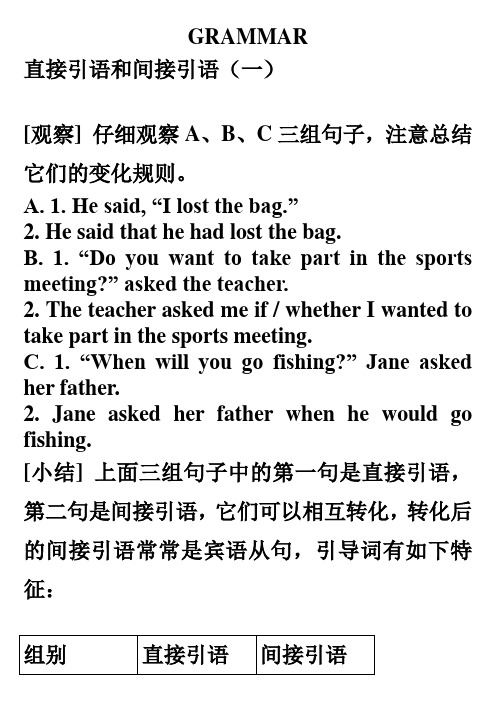
GRAMMAR直接引语和间接引语(一)[观察] 仔细观察A、B、C三组句子,注意总结它们的变化规则。
A. 1. He said, “I lost the bag.”2. He said that he had lost the bag.B. 1. “Do you want to take part in the sports meeting?” asked the teacher.2. The teacher asked me if / whether I wanted to take part in the sports meeting.C. 1. “When will you go fishing?” Jane asked her father.2. Jane asked her father when he would go fishing.[小结] 上面三组句子中的第一句是直接引语,第二句是间接引语,它们可以相互转化,转化后的间接引语常常是宾语从句,引导词有如下特征:同时,时态也要进行相应的变化,一般规律如下:[温馨提示]1.注意宾语从句使用陈述语序。
Father said, “What’s the matter?”→Father said what was the matter.2. 直接引语变为间接引语时,一些词或词组也要变。
如:指示代词:this → that, these → those; 动词:come → go; 时间:now → then, tomorrow → the next day; last week → the week before; 地点:here → there; 人称:I → he / she ... 等。
如:Tom said, “I will come here with my father tomorrow.” →Tom said he would go there with his father the next day.3. 当直接引语强调的是客观事实或真理,变为间接引语时,从句中的时态不变。
高一英语直接引语与间接引语-精选文档
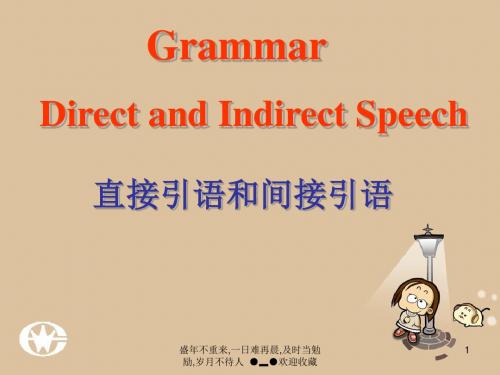
3.主句谓语动词的时态是现在时态,在引述时, 时态不变。 She says, “I’ll never forget the days in the country.”
She says that she’ll never forget the days in the country.
盛年不重来,一日难再晨,及时当勉 励,岁月不待人 ●▂●欢迎收藏
地点状语
方向性动词
here 盛年不重来,一日难再晨,及时当勉 bring 励,come, 岁月不待人 ●▂●欢迎收藏
there go, take
7
谓语动词时态变化(参见《双语报》B3), 需要注意几点:
1.直接引语表述的是客观真理,变为间接引语时, 时态不变
The geography teacher said, “The sun rises in the east and sets in the west.” The geography teacher told us that the sun rises in the east and sets in the west.
盛年不重来,一日难再晨,及时当勉 励,岁月不待人 ●▂●欢迎收藏 5
在直接引语变为间接引语时需要注意的变化 1. 注意时态的变化 2. 注意人称变化。
3. 注意指示代词的变化
4. 注意时间的变化 5. 注意地点的变化 6. 注意个别趋向动词的变化
盛年不重来,一日难再晨,及时当勉 励,岁月不待人 ●▂●欢迎收藏 6
Grammar
Direct and Indirect Speech
直接引语和间接引语
盛年不重来,一日难再晨,及时当勉 励,岁月不待人 ●▂●欢迎收藏
1
Grammar: Direct and Indirect Speech (1) 1. 转述他人的陈述→陈述句 He said , “I’m going to Beijing.” → He said that he was going to Beijing. 2. 转述他人的疑问→一般疑问句 He asked, “Are you a teacher?” → He asked me if /whether I was a doctor. 3. 转述他人的问题→特殊疑问句 She said , “What are you doing?” → She asked me what I was doing.
直接引语和间接引语的区别和用法

直接引语和间接引语的区别和用法
直接引语和间接引语的区别和用法
一、直接引语的定义
直接引语是指引用某人曾经说过的话,将原话按原样(全部或部分)写出来,并用引号括起来,以区别于正文的写法。
二、间接引语的定义
间接引语是指把某人曾经说过的话,用自己的语言写出来,以表示对原话的转述。
三、直接引语与间接引语之间的区别
1、原文形式的不同:直接引语是用原文来直接引用某人的话,而间接引语是用自己的话来表达某人原来所说的话;
2、标点符号的不同:直接引语是用引号括起来,以表示引用,而间接引语没有用引号。
3、语气的不同:直接引语表示的是原话的语气,间接引语表示的是引用者的语气。
四、直接引语和间接引语的用法
1、直接引语的用法
(1)引用形式可以是全文、部分文、句子或单词等;
(2)把引号括起来,以区别于正文文体;
(3)为了实现彻底的分离,也可以用段落的形式来引用;
(4)引号内的文字不用修订病句;
(5)语气用词保留原文的语气,不能换成自己的说法。
2、间接引语的用法
(1)用句子的形式表达原话;
(2)保留原文的意思,但可以改变句式;
(3)可以改变原话的语气;
(4)谓语命中后面的人称和时态要和句子的主语保持一致。
Grammar1直接引语变间接引语
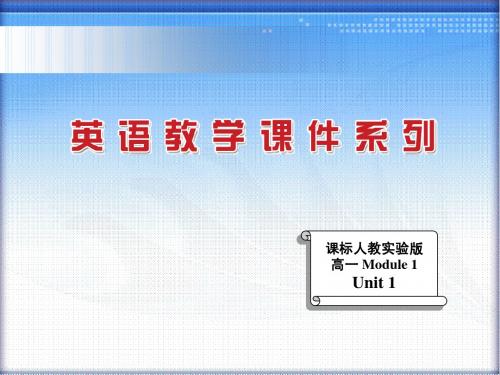
8. Jack said to her, “Where do you
spend your holidays?”
Jack asked her where ____ holidays.
A. she spent her B. you spend your
C. she spend her
D. you spent your
D. if he heard…the week ago
7. She asked, “Whose house will he break into next time ?” She asked whose house ____ break into _____. A. will he…next time B. would he…the next time C. he would…the next time D. he will…next time
4. 部分情态动词,如must, ought to, used
to, had better等: She said to me: “You must hurry up.” → She said that I must hurry up.
由直接引语转变为间接引语,下列代词、 形容词、副词、动词等可能要变化
“Is this your asked John.
语从句 that was her
umbrella.
umbrella, Mary?” John asked Mary if
直接引语 (变化前) 特殊疑问句 you return me the
间接引语(变化后) wh-词引导的宾语从句 when she would
2. We said to her, “They’re walking through the street now.” We told her that ___ through the street ___. A. we were walking…then B. you are walking…now C .they were walking…then D. they walking…now
Unit 1 Grammar直接引语变间接引语

What did Mary say?
Mary
Mary said :“I am late.” 直接引语
Mary said she was late. 间接引语
Grammar
Direct and Indirect Speech
直接引语和间接引语
Direct and Indirect Speech
ห้องสมุดไป่ตู้
He said he was going to do his homework.
What did he say?
“I am going to do my homework.”
人 称 时 态
He said
he was going to do his homework.
“一随主”
1 She said, “I am hungry.” She said (that) she was hungry. 2 He said , “ I am a solider.” He said (that) he was a solider
3 She said, “I am swimming” She said (that) she was swimming.
“二随宾” He said to Kate, “Your sister looks friendly.” He told Kate her sister looked friendly.
Practices:
1.Tom said, “ I am a teacher”.
2. Mary said, “I am having breakfast.” 3.The little girl said, “ I can sing a lot of English songs.”
初中英语语法-直接引语和间接引语

初中英语语法-直接引语和间接引语
语法要点:直接引语和间接引语属于宾语从句范畴。
直接引述别人的原话,叫直接引语;用自己的话转述别人的话,或引用自己说过的话,叫间接引语。
由于时间、地点以及人物都有可能起变化,所以间接引语中的时态、人称、语序、指示代词、时间状语、地点状语等要作相应的变化。
1. 直接引语和间接引语的转换方法
①间接引语语序改为陈述句语序
陈述句用that 引导,口语中常省略She said,例:
“I am going to the cinema. ”
→ She said (that) she was going to the cinema.
②一般疑问句
用if/whether连接,例:
“Have you ever travelled by plane?” she asked me.
→ She asked me if / whether I had travelled by plane.
③反意疑问句
用if/whether连接,例:
He asked,“You are a doctor,aren’t you?”
→ H e asked (me) if / whether I was a doctor.。
Unit1语法(直接引语和间接引语)

】
When seeing the stone, the car stopped.【误】
必修1
【链接训练】 ________, the disease diphtheria(白喉) will produce a
powder poison that will kill the patient.
A.If it untreated C.If being untreated 【解析】 B.If is untreated D.If untreated
必修1
Young as I am,I already know what career I want to follow.(引导让步状语从句) 尽 管 很年轻 ,我已经知道我要追求什么样的事业 。 Why didn't you catch the last bus as I told you to?(引导方式 状语从句) 你为什么没照我说的那样赶上最后一班公交车? As you weren't there,I left a message.(引导原因状语从 句)你不在那儿,所以我留了个口信。
必修1
(2)“介词with+宾语+宾语补足语”构成的复合结构 在句子中通常作状语,表示时间、伴随、行为方式、原因或 条件等,另外,该结构也可以作后置定语。 She ran and ran with beads of sweat running down her face.她不停地跑,汗珠顺着脸流了下来。
一、把直接引语变为间接引语时需要注意以下变化:
1.主句谓语动词的变化 (1)直接引语是陈述句,变为间接引语时,主句的谓语 动词部分said to sb.要变为told sb.。 (2)直接引语是一般疑问句或特殊疑问句,变为间接引 语时,主句的谓语动词said要变为asked。
book1 unit1 grammar直接引语和间接引语
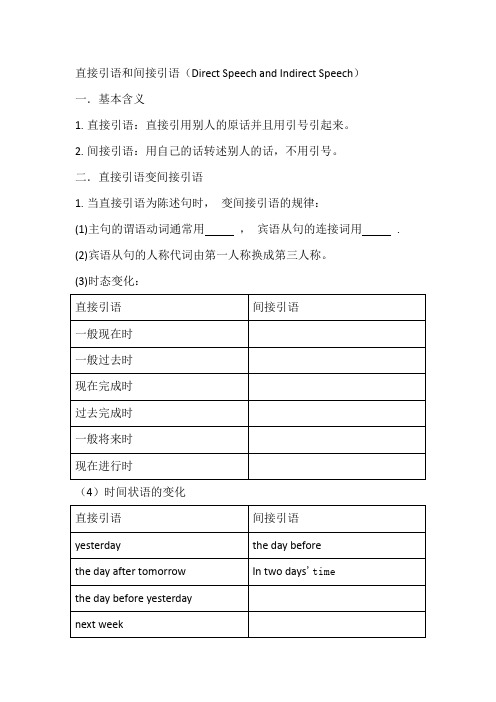
直接引语和间接引语(Direct Speech and Indirect Speech)一.基本含义1.直接引语:直接引用别人的原话并且用引号引起来。
2.间接引语:用自己的话转述别人的话,不用引号。
二.直接引语变间接引语1.当直接引语为陈述句时,变间接引语的规律:(1)主句的谓语动词通常用,宾语从句的连接词用.(2)宾语从句的人称代词由第一人称换成第三人称。
(3)时态变化:(4)时间状语的变化(5)地点状语的变化(6)指示代词的变化(7)方向性动词的变化Eg . “I don't want to set down a series of facts in a diary,”Said Anne. (变间接引语)注意:当直接引语为客观事实,普遍真理时,变间接引语时时态不变。
Eg. He said, “Light travels much faster than sound.”→He said that light (travel) much faster than sound.2.当直接引语为一般疑问句时,变间接引语的规律主句的谓语动词通常用, 宾语从句的连接词用引导,并且用陈述语序。
主语的人称,时态,状语等也要做相应的变化。
Eg. He said,”Are you interested in English ?”(变间接引语)3.当直接引语为特殊疑问句时,变间接引语的规律主句的谓语动词用,从句依然用原来的特殊疑问词引导,语序要用,其人称,时态,状语等也要做相应的变化。
Eg. “What do you want ?”he asked me. (变为间接引语)4.当直接引语是祈使句时,变间接引语的规律通常要借助于动词ask, order, tell 等其人称,时态,状语等也要做相应的变化。
Eg. The hostess said to us, “Please sit down”.(变为间接引语)练习:1.Mr Green asked Lily whether she had passed the exam .A.yesterdayB. the day beforeC. the day agoD.before the day2.(2014.厦门高一检测) He told us that there a football match at 19:00.A.were going to haveB. Is going to beC. will beD. was goingto be3.(2014.九江高一检测) “What has made these companies get into trouble?” He asked.→He asked .A.What had made these companies get into trouble.B.What made these companies get into trouble.C.What has made those companies get into trouble.D.What had made those companies get into trouble.4.(2014.南昌高一检测) I failed again, but my parents encouraged me and told me that failure the mother of success.A.wasB. isC. beD. has been5.(2014.杭州高一检测) “Have you ever been to the seaside ?”he asked me .→He asked me .A.Had I ever been to the seaside.B.Have I ever been to the seaside.C.Whether I had ever been to the seaside.D.If I have ever been to the seaside.6.He once told us that Shanxi aged vinegar (山西老陈醋)usually at least one year to produce.A.tookB. has takenC. takesD. Will take7.(2014.杭州高一检测)John asked me to visit his uncle's farmwith him.A.how would I likeB. if or not would I likeC. whether I would likeD. which I would like答案:1-7 bddbccc把下列直接引语变为间接引语1.“I never eat meat,”he said.→2.He said to me , “I have found my book.”→3.“What does he mean?”she asked.→4.Mr Green asked, “Jack, did you see the film yesterday?”→Mr Green asked Jack he had seen the film.5.“Please don't disturb me,”he said to the girl.→He the girl him.答案:1. He said that he never ate meat.2.He told me that he had found his book.3.She asked what he meant.4.whether the day before.5.Asked; not to disturb。
Grammar-- 直接引语变间接引语

?
She said
they would go shopping.
直接引语变为间接引语 1.(Gina) I will call you on Sunday. Gina said she would call me on Sunday. 2.(Tony) I go camping every week. Tony said he went camping every week.
we It said to us you were playing football.
三不变 She said, “He finished his homework .”
She said he had finished his homework.
They will go shopping .
What did she say
3.(Linda) I am upset at my report card.
Linda said she was upset at her report card. 4.(Tanya) I am learning to speak English. Tanya said she was learning to speak English. 5.(Kenji) I will go to Sam’s house Friday night.
时 间
直接引语
now
→
间接引语
then
today Yesterday
the day before
that day the day before
two days before
this week (month, etc.) that week (month, etc.)
Book 1 Unit 1-2 Grammar 直接引语和间接引语
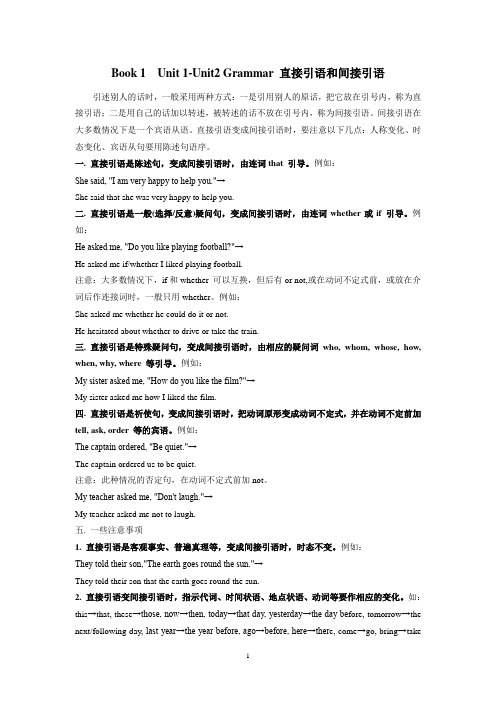
Book 1 Unit 1-Unit2 Grammar 直接引语和间接引语引述别人的话时,一般采用两种方式:一是引用别人的原话,把它放在引号内,称为直接引语;二是用自己的话加以转述,被转述的话不放在引号内,称为间接引语。
间接引语在大多数情况下是一个宾语从语。
直接引语变成间接引语时,要注意以下几点:人称变化、时态变化、宾语从句要用陈述句语序。
一. 直接引语是陈述句,变成间接引语时,由连词that 引导。
例如:She said, "I am very happy to help you."→She said that she was very happy to help you.二. 直接引语是一般(选择/反意)疑问句,变成间接引语时,由连词whether或if 引导。
例如:He asked me, "Do you like playing football?"→He asked me if/whether I liked playing football.注意:大多数情况下,if和whether 可以互换,但后有or not,或在动词不定式前,或放在介词后作连接词时,一般只用whether。
例如:She asked me whether he could do it or not.He hesitated about whether to drive or take the train.三. 直接引语是特殊疑问句,变成间接引语时,由相应的疑问词who, whom, whose, how, when, why, where 等引导。
例如:My sister asked me, "How do you like the film?"→My sister asked me how I liked the film.四. 直接引语是祈使句,变成间接引语时,把动词原形变成动词不定式,并在动词不定前加tell, ask, order 等的宾语。
- 1、下载文档前请自行甄别文档内容的完整性,平台不提供额外的编辑、内容补充、找答案等附加服务。
- 2、"仅部分预览"的文档,不可在线预览部分如存在完整性等问题,可反馈申请退款(可完整预览的文档不适用该条件!)。
- 3、如文档侵犯您的权益,请联系客服反馈,我们会尽快为您处理(人工客服工作时间:9:00-18:30)。
He said, “I’m using the knife.”
She said, “I’ve She said that she had not heard from not heard from him since May.” him since May.
直接引语转换 成间接引语时 直接引语 间接引语 的时态变化 一般过去时— He said, “I He said that he had came to help you.” come to help me. 过去完成时 过去完成时— He said, “I had He said that he had finished finished my 不变 homework before the homework before… supper.” 一般将来时— She said, “I’ll do it after class.” 过去将来时
重庆大学版 高一(1) Unit 2
Direct Speech & Indirect Speech
引语的概念
直接引述别人的原话,叫 ___________; 直接引语 用自己的话把别人的话陈述出来,叫 间接引语 _________。 引号“ ” 直接引语通常都用_________括起来,
间接引语在多数情况下都构成一个
不可直接说told that。
陈述句解题步骤: “I don’t like computers,” Sarah said to her friends. Sarah said to her friends that ( I don’t like computers.)
she didn’t Sarah said to her friends that she didn’t like computers.
3. 选择疑问句 用whether…or…表达,而不用
if…or…,也不用either…or…
• He asked, “Do you speak English or French?” • He asked me whether I spoke English or French.
4. 特殊疑问句 原来的疑问词作为间接引语的连词, 主句的谓语动词用ask (sb.)来表达, 语序改为陈述句语序。
时 间 状 语
the day before yesterday two days before tomorrow the next day next month the next month here come, bring there go, take
地点状语 方向性动词
2. 指示代词、时间状语、地点状语的变化
直接引语 this, these
now, today this week yesterday last week four days ago
间接引语 that, those
then, that day that week the day before the week before four days before
5.直接引语是感叹句,间接引语可用 what/how引导,也可用that引导 She said :“What a lovely day it is! ” she said What a lovely day it was she said that it was a lovely day
6. 祈使句
examination the next Monday.
1. She said, “I like English very much.” →She said that she liked English very much. 2. Betty said, “I’ll be waiting for your call.” →Betty said that she would be waiting for my call.
直接引语
He said, “I’m afraid I can’t finish the work.”
间接引语
He said that he was afraid he couldn’t finish… He said that he was using the knife.
现在进行时— 过去进行时
现在完成时— 过去完成时
• He said, “I have been to the Great Wall.” • He said to us that he had been to the Great Wall.
• He said, “I’ll give you an examination
next Monday.”
• He told us that he would give us an
特殊疑问句解题步骤: When do you harvest the wheat? ( They asked him ) you harvest the wheat They asked him when (you harvest the wheat.) he harvested They asked him when he harvested the wheat.
二 随 宾
第三 引号内的第三人 She said to me, She told me that 称在变间引后人 “ They want to they wanted to 人称 help him”. help him. 称不变 不变
3 时态的变化
直接引语转换成间 接引语时的时态变 化 一般现在时— —般过去时
直接引语变为间接引语时.
人称,时态,指示代词,时间状语, 地点状语,句型等要相应进行变化。
1 人称的变化 一随主,二随宾,第三人称不更新
口诀
一 随 主
说明
引号内的第一人 称变间引后与主 句主语的人称保 持一致 引号内的第二人 称变间引后与主 句宾语的人称保 持一致
直接引语
间接引语
She said,“ I like She said that she liked tennis. Tennis.” He said to Lily, He told Lily that “you must get she must get up up early”. early.
宾语从句 ___________。
There is no baby playing with me.
She said that there was no baby playing with her.
I want to give the flower to my sister!
She said that she wanted to give the flower to her sister.
Do you feel any better? The woman asked if the dog felt any better.
I look beautiful.
She said she looked beautiful.
I am a lucky girl. 直接引语:直接引用别人的话, 把它放在 引号内。 (direct speech) She said, “I am a lucky girl.” 间接引语: 用自己的话转述别人的话。 (indirect speech) She said that she was a lucky girl.
• He said to me,“What’s your name?”
• He asked me what my name was. • He asked us, “How many car factories have been built in your country?” • He asked us how many car factories had been built in our country.
祈使句的直接引语变间接引语就是把祈
使句变成一个不定式作宾语补足语的句 子(把动词原形变成动词不定式)。在 这种句子中用什么作谓语,要根据所引 句子的口气来决定: ask/tell/order/advise sb. to do sth. 注意:否定句,在动词不定式前加not
或never。
1. The teacher said to the student, “Don’t be late again.” →The teacher told the student not to be late again. 2. “Wake him up,” she said to me. → She told me to wake him up.
They asked him if it was easy to improve the condition of the soil.
• He said, “Do you have any difficulty
with pronunciation?”
• He asked (me) whether/if I had any difficulty with my pronunciation. • He said, “You are interested in English, aren’t you?” • He asked whether I was interested in English.
She said that she would do it after class.
1. 直接引语变为间接引语的时态变化: 直接引语 一般现在时 一般过去时 一般将来时 现在完成时 现在进行时 过去完成时 间接引语 一般过去时 过去完成时 过去将来时 过去完成时 过去进行时 过去完成时
2
指示代词
the next week
地点 Here 状语
